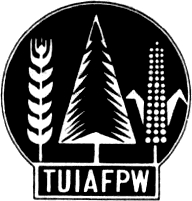Related Research Articles

The General Confederation of Labour is a national trade union center, founded in 1895 in the city of Limoges. It is the first of the five major French confederations of trade unions.
The Trade Union International of Agroalimentary, Food, Commerce, Textile and Allied Industries is one of ten Trade Union Internationals of the World Federation of Trade Unions (WFTU).
The Federation of the National Education was a French federation of teaching unions.
Trade unionism is a powerful force in the politics, economy, and culture of Senegal, and was one of the earliest trades union movements to form in Francophone West Africa.
Confédération générale du travail du Burkina is a revolutionary national trade union centre in Burkina Faso. Bassolma Bazié the general secretary of CGT-B.
Trade unions in Guinea were historically important - having played a pivotal role in the country's independence movement - and in recent years have again assumed a leading role.
The Trade Union International of Workers in Commerce was a trade union international affiliated with the World Federation of Trade Unions.

The Trade Unions International of Chemical, Oil and Allied Workers was a trade union international affiliated with the World Federation of Trade Unions. It was often known by its French initials, ICPS.

The Trade Union International of Agricultural, Forestry and Plantation Workers was a trade union international affiliated with the World Federation of Trade Unions.

The National Federation of Miners was a trade union representing miners in France.
The World Federation of Agriculture and Food Workers was an International Trade Federation affiliated to the World Confederation of Labour (WCL).
The National Federation of Textile Industry Workers was a trade union representing workers in the textile industry in France.
The Textile, Clothing, Leather and Laundry Federation is a trade union representing workers in several related industries in France.
The Clothing Federation was a trade union representing workers in the garment industry in France.
The National Federation of Hides and Leather was a trade union representing workers in the leather and fur industries, including shoemakers, in France.
The National Federation of Agri-Food and Forestry is a trade union representing agricultural, forestry, and food industry workers in France.
The National Federation of Construction Workers was a trade union representing workers in the construction industry in France.
The General Federation of Agriculture, Food, Tobacco and Related Services Workers is a trade union representing workers in a range of related industries in France.
The Federation of Tobacco and Matches was a trade union representing workers in the tobacco industry in France.
References
- 1 2 3 4 "FEDERATION NATIONALE DES TRAVAILLEURS DE L'AGRICULTURE -FNTA- (CGT) 1903-1981" (PDF). Seine Saint Denis. Retrieved 10 April 2020.
- ↑ Bulaitis, John (2008). Communism in Rural France. I. B. Tauris. p. 35. ISBN 1845117085.
- ↑ "PARSAL André, Paul, Baptiste". Le Maitron. Retrieved 13 April 2020.